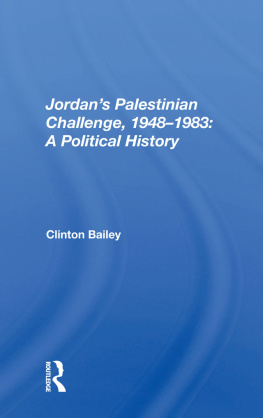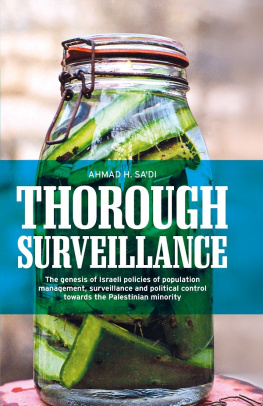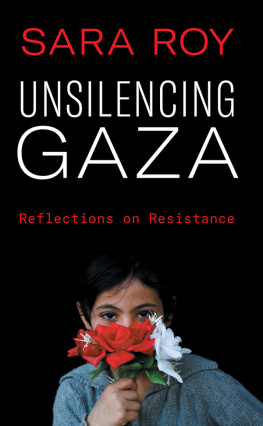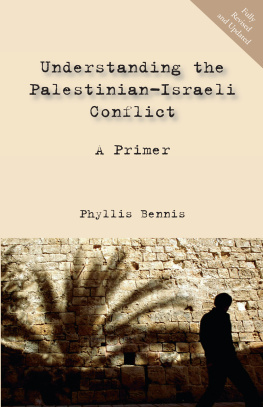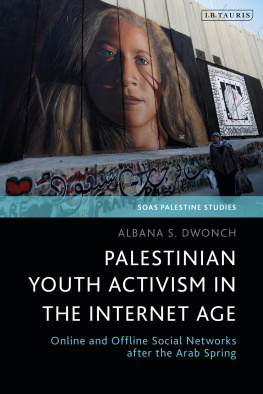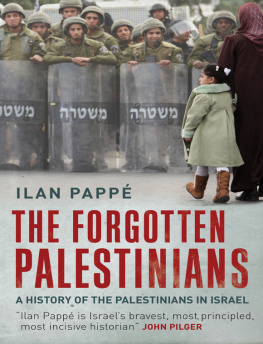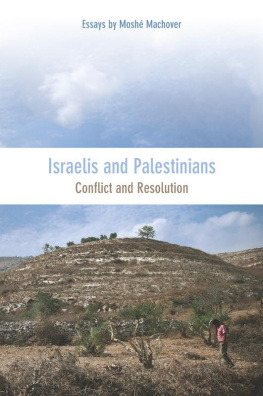Stanford University Press
Stanford, California
2018 by the Board of Trustees of the Leland Stanford Junior University. All rights reserved.
No part of this book may be reproduced or transmitted in any form or by any means, electronic or mechanical, including photocopying and recording, or in any information storage or retrieval system without the prior written permission of Stanford University Press.
Printed in the United States of America on acid-free, archival-quality paper
Library of Congress Cataloging-in-Publication Data
Names: Berda, Yael, author.
Title: Living emergency : Israels permit regime in the occupied West Bank / Yael Berda.
Description: Stanford, California : Stanford Briefs, an imprint of Stanford University Press, 2017. | Includes bibliographical references.
Identifiers: LCCN 2017033750 (print) | LCCN 2017035544 (ebook) | ISBN 9781503605299 (electronic) | ISBN 9781503602823 (pbk. : alk. paper)
Subjects: LCSH: Freedom of movementWest Bank. | Palestinian ArabsLegal status, laws, etc.West Bank. | Military governmentWest Bank. | Palestinian ArabsGovernment policyIsrael. | War and emergency legislationIsrael.
Classification: LCC KMM748.2 (ebook) | LCC KMM748.2 .B47 2017 (print) | DDC 342.569408/58dc23
LC record available at https://lccn.loc.gov/2017033750
Typeset by Bruce Lundquist in 10/13 Adobe Garamond
PROLOGUE
Issa lives with his wife and three children near Hebron in the south of the Israeli-occupied West Bank. In 2001, Issa began working in construction for a Jerusalem-based contractor. Through the Payments Section of the Israeli Employment Bureau, which set quotas for the number of Palestinian laborers Israeli companies could employ within Israel proper, Issa received an official work permit that allowed Issa to enter Israel from 5:00 a.m. to 7:00 p.m. every day. The work permit was conditional on the possession of another documenta biometric identity card (a magnetic smart card), which was provided to Issa by the Hebron office of the Coordinator of Government Activities in the Occupied Territories (COGAT.) Every three months, the construction company would apply for a bulk renewal of work permits for all its workers, including Issa. The work permit was duly renewed regularly until the fall of 2004.
In November 2004, the company applied once again to renew the permits for all its workers. Out of the fifteen applications, two were refused, including Issas. The rejection alarmed him. Neither he nor his employer could determine why his permit renewal was declined. After speaking to a few of his colleagues, Issa thought the reason might simply be the approaching expiration date of his magnetic card. Palestinian residents of the Occupied Palestinian Territories (hereafter Occupied Territories) had to renew their cards every two years, so Issa started the process. He went to the District Coordination Office (DCO) in Hebron, paid a registration fee of NIS 145 (New Israeli shekels), and after waiting for several hours (the DCO did not have regular office hours), approached the soldier at the booth. The soldier told Issa he was classified as restricted for security reasons by police (manua mishtara), which means the Israeli police denied him entry into Israel. The soldier wrote the letters MM with a black felt-tipped pen on his application form.
The next day, Issa returned to the DCO to ask how he could appeal his travel ban. He wanted to know which official had made the decision to place him under a police security restrictionand whyand hoped to speak to this person directly. The soldier at the booth told him to go to the police representative at the DCO, but the representative was not in the office that day. A few days later, Issa returned and was told that the entire DCO, a department of the military Civil Administration, was closed for renovations for the next two weeks.
In January 2005, Issa made a formal request to the police representative at the DCO, and ten days later he was informed that the police had filed two criminal charges against him for entering Israel without a permit, one at the Moria police station in Jerusalem and a second at the police station in Bat Yam. A police officer said that he had no authority or discretion to remove the security restriction and could only deliver information about the restriction, kind of like customer service. He told Issa that the only way to remove the proscription was to hire a lawyer who could petition to close the criminal cases. Issa still had no idea why he was restricted.
At that time, I was an Israeli lawyer licensed to interact with the Israeli civilian police, so Hassan approached me to assist on the case. Every police district had different procedures for processing offenses of illegal entry. Therefore, in March 2005, to obtain dismissal of the charges and close Issas illegal entry files for lack of public interest (the authorities did not think the case was important enough to pursue), I contacted the prosecution department of the Tel Aviv district police in the Ayalon region for the Bat Yam station and the investigations department of the Moria station in Jerusalem. When my written requests went unanswered, I called Moria station on the phone. The station operator told me that even though the police database (known as Rolling Stone) lists Issas case as administered by the Jerusalem police station, since the separation wall had been built, the cases have been processed by the Jerusalem Envelope (Otef Yerushalaim) investigations unit of the Border Police, to which cases concerning Palestinian illegal aliens are automatically transferred. When I called that unit, based in the Atarot Industrial Zone in annexed East Jerusalem, a young policewoman told me the unit runs a dedicated hotline for lawyers, operating exclusively between 9:00 a.m. and noon on Thursdays. On Thursday, I called the Jerusalem Envelope investigations unit, but no one replied. I sent a fax to the chief of the unit, Lt. Moshe Avital, who called back personally with a promise to close the case as soon as it arrived at his desk.
The case at the Bat Yam station took even longer to move forward. My attempts fell over the Passover holiday, and it was impossible to reach the various litigation departments involved. A mere administrative procedure such as closing Issas file was not seen as urgent and therefore would not be handled until after the holiday. After I sent several letters, the prosecution department informed me by fax on May 10, 2005, that the case was dropped for lack of public interest. I called Hassan and told him one of the cases was closed; he said he would tell Issa and take care of the rest of the procedure with the Civil Administration. The next day, he contacted the police representative at the DCO with the fax from the prosecutors. The police officer told him he would need an official form from the police registrar. Again, Hassan could not approach the Israeli civilian police directly, so he called me to procure the form. The entire processan administrative one, since the legal merit of the cases of illegal entry was never discussedtook nearly three months, during which time Issa could not enter Israel to work.
A week later in May, Issa returned to the DCO with the official form in hand, but again he was informed he was still under a police security restriction, which also means that he was still not eligible for a new magnetic card. Hassan called the police representative at the DCO and was told that updates from the database at the national police headquarters to the military database on the status of a case could take ten to fourteen days. I tried to speed up the process by calling the national police headquarters directly and was directed to the subunit on entry bans. The secretary told me that since there were only two clerks to enter updates on closed cases into the Rolling Stone database, in a procedure called an exceptional populations status update (



